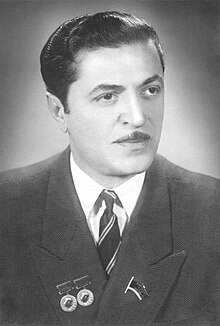Niyazi
Niyazi Hajibeyov Niyazi Hacıbəyov | |
|---|---|
 | |
| Background information | |
| Birth name | Niyazi Hajibeyli |
| Also known as | Maestro Niyazi; Nijazi Zul'fugarovich Tagi-zade-Hajibeyov[1] |
| Born | August 20, 1912 Tiflis, Russian Empire |
| Died | August 2, 1984 (aged 71) Baku, Azerbaijan SSR, Soviet Union |
| Genres | Classical, opera |
| Occupation(s) | Composer, conductor |
| Years active | 1934–1984 |
Niyazi Zulfugar oghlu Taghizade Hajibeyov (Azerbaijani: Niyazi Zülfüqar bəy oğlu Hacıbəyov; 20 August 1912 – 2 August 1984) was a Soviet and Azerbaijani conductor and composer. People's Artist of the USSR (1959) and Hero of Socialist Labour (1982).
Early life
Niyazi was born on August 20, 1912, in Tbilisi in a family of prominent Shusha musicians.[2] His father was the composer Zulfugar Hajibeyov. He is the nephew of Uzeyir Hajibeyov, the founder of the Azeri classical music. He played the violin in "Qırmızı Kadet" Turkish military orchestra in 1921. He studied at the Gnessin Music School in Moscow in 1925-1926.[3] In 1929-30 he studied at the Central Musical Technical School in Leningrad, but dropped out due to health problems. He returned to Baku in 1931. Right after that he was sent to Dagestan where he met his future wife Həchər khanum. Hecher Khanum's family would not approve of the marriage. So she and Niyazi decided to run away and secretly got married. They lived a very difficult yet fulfilling life. The great love of his wife gave him strengths to produce most of his masterpieces, which contributed to Azerbaijan's and the musical treasury of the rest of the world.
Works
Niyazi conducted many of the major symphony orchestras in Prague, Berlin, Budapest, Bucharest, New York, Paris, Istanbul, London, Tehran, Beijing and Ulan-Bator and played an important role in making the Azeri classical music known to the world.
Niyazi was also a talented composer. Building upon the traditions of Uzeyir Hajibeyov, he splendidly synthesized the traditional Azeri folk songs and mugham with western classical symphonic music. Niyazi's most significant works include the opera "Khosrow and Shirin" (1942), and the ballet "Chitra" (1960).[3] His symphonic mugham "Rast" achieved worldwide popularity and was included to the repertoire of many symphony orchestras around the world.
Niyazi was the conductor and music director of the Azerbaijan State Symphony orchestra for 46 years, from 1938 to his death. He died on August 2, 1984.[2]
Niyazi was honored as the People's Artist of the USSR (1959)[4] and received the Stalin Prize (1951, 1952) and Hero of Socialist Labour (1982).[5]
See also
References
- ^ Yampol'sky, I.M. (2001). "Nijazi". In Sadie, Stanley; Tyrrell, John (eds.). The New Grove Dictionary of Music and Musicians (2nd ed.). London: Macmillan Publishers. ISBN 978-1-56159-239-5.
- ^ a b "Maestro Niyazi". Retrieved 2010-12-10.
- ^ a b "Maestro Niyazinin vəfatından 35 il ötür - Mədəniyyət xəbərləri". www.medeniyyet.info. Retrieved 2020-12-19.
- ^ "Məktəblinin Elektron Musiqi Kitabxanası / Bəstəkarlar". mk.musigi-dunya.az. Retrieved 2020-12-19.
- ^ "Bakı Musiqi Akademiyası - Niyazi Zülfüqar oğlu Hacıbəyov-Tağızadə". musicacademy.edu.az (in Azerbaijani). Retrieved 2020-12-19.
External links
- Listen to Niyazi, Music Section of Azerbaijan International
- 1912 births
- 1984 deaths
- 20th-century Azerbaijani composers
- 20th-century classical musicians
- 20th-century conductors (music)
- 20th-century male musicians
- Musicians from Tbilisi
- Eleventh convocation members of the Supreme Soviet of the Soviet Union
- Members of the Central Committee of the 26th Congress of the Communist Party of the Soviet Union
- Members of the Supreme Soviet of the Azerbaijan Soviet Socialist Republic
- Baku Academy of Music alumni
- Komitas State Conservatory of Yerevan alumni
- Heroes of Socialist Labour
- Honored Art Workers of the Azerbaijan SSR
- People's Artists of Armenia
- People's Artistes of the Azerbaijan SSR
- People's Artists of the USSR
- Recipients of the Order of the Badge of Honour
- Recipients of the Order of Lenin
- Recipients of the Order of the October Revolution
- Recipients of the Order of the Red Banner of Labour
- Recipients of the Stalin Prize
- Ballet conductors
- Music directors (opera)
- Azerbaijani ballet composers
- Azerbaijani classical composers
- Azerbaijani conductors (music)
- Azerbaijani film score composers
- Azerbaijani male composers
- Azerbaijani opera composers
- Soviet Azerbaijani people
- Soviet conductors (music)
- Soviet film score composers
- Soviet male classical composers
- Soviet opera composers
- Burials at Alley of Honor
